#tsaatan
Explore tagged Tumblr posts
Text
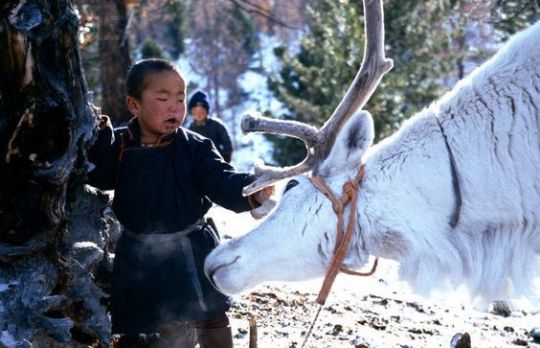
Dukha/Tsaatan boy, Mongolia
14 notes
·
View notes
Photo
Tsaatan people of the Northern Mongolian taiga.


(via c21a70048ba298054651cf591bc4f5c8.jpg (736×1104))
157 notes
·
View notes
Text



Jatenipat Ketpradit 📷
Tsaatan: The Last Reindeer People
Winning Category: People Photography – Culture
10 notes
·
View notes
Text
youtube
Reindeer Dance of Mongolia | Tsaatan dance | Цаатан бүжиг
#dance#folk dance#mongolia#choreography#tradional dance#tsaatan dance#reindeer dance#culture#Youtube#Цаатан бүжиг
1 note
·
View note
Text

A young woman belonging to the TSAATAN tribe in Mongolia, Central Asia, riding a deer. The Tsaatan are a tribe of just under 250 people who are considered the last reindeer herders in Mongolia.
124 notes
·
View notes
Text

The Tsaatan (Dukha) Reindeer Nomads, Mongolian North, Hamid Sardar-Afkhami
11 notes
·
View notes
Text
First of all, sorry for my english writing, it's not my first language :').
I'm just thinking about something related to ATLA, an AU where the four nations and the characters are swapped. But not just that; instead of Aang, Toph will be the Avatar, and she will still be blind. She is found by the Fire Nation siblings Zuko and Azula in a volcano with her pet badgermole. I have always been looking for an AU like that, but I have never found it completely, so I decided to create my own. I know that there are already some AU blogs or fanfics with this same concept, and maybe if it's not creative at all, I want to show my own interpretation of this AU. We can share headcanons and fanfics about this subject and discuss it. I deeply want to know what people will think about this—whether my interpretation is good or bad. Anyway, let's talk about it! :) (Many aspects of this fanfic, especially regarding the villains, are inspired by the fanfic Avatar: Distorted Reality, but don't worry; I will try to ensure this is not an entirely copied work, I promise).
Some things about background and worldbuilding:
• The Air Nomads will remain the same and have the cultural inspiration from the show (Tibetan Buddhists and Bhutan). The only difference from the canon is that these Air Nomads would develop science and technology significantly, especially aerospace technology like air balloons and gliders (as shown in the episode "Northern Air Temple"). They would also be alchemists, inspired by Chinese alchemy, and develop science and medicine alongside spirituality. The Water Tribes (in this case, the Water Empire) will have more Siberian groups inspiration, but with building and architecture, and marine domination and technology inspired by Srivijaya and the Khmer Empire. They will have incredibly aquatic-inspired technology and highly developed science and engineering, also they will be akin to Chinese Empire.
Fire Nation: It is a fact that the Fire Nation is very inspired by Imperial Japan. In this universe, since they are no longer militaristic and industrialized, they principal cultural background will be inspired by the Polynesian, Micronesian and Melanesian groups from Pacific Islands. They will also draw inspiration from Phillipines, Malaysia, Indonesia and Sri Lanka as well as Aztec, Inca, and Maya cultures, making them a culture more akin to the Sun Warriors. The societal structure will be more tribal, with each archipelago of the Fire Nation being a tribe led by a high-class family represented by the Fire Lord (the equivalent of a chieftain instead of a monarch). This high-class family is a clan with a surname to differentiate them from other families.So, despite Zuko and Azula not being royalty, they are very respected because they the children of the chieftain of their village.
Earth Kingdom: The source of cultural inspiration for the Earth Kingdom will differ from the canon. Instead of the Chinese Dynasty and Korea, the focus will be on underrepresented Asian peoples, drawing great inspiration from the Highland peoples of Vietnam and Thailand (especially the Hmong people), the Evenki people, the Ainu people, Siberian-Mongolian nomads (Tsaatan, Tuvan, and Byart), and minority ethnic Chinese groups (Bouyei, Qiang, and Mulao). Just like the Fire Nation, they will not be very militaristic or highly structured, but they will have a decentralized society that works in a tribal and community-oriented style. Therefore, they will not have a kingdom anymore but rather fractured tribes and villages that have a strong sense of community (living near mountains, caves, or underground). With that, Toph will not be the daughter of an aristocratic family; she will have humble roots this time.
Also, the names of the nations will be different; they will be:
• Fire Tribe
• Air Realm
• Water Empire
• Earth Clan
With all this, let's explore and see the roles of the characters in this alternative universe:
Toph Beifong the Avatar (in the role of Aang): Toph lives in the Southern Mountains of Gaoling in the Earth Clan, in small simple tents and hidden caves in the mountains. She is part of the small Beifong Tribe, and her parents are humble badgermole herders. Since the people of the Earth Clan are identified by their tribe, her name remains "Toph Beifong" to show that she is from the Beifong Tribe of the Gaoling Mountains. Despite this, her parents are very overprotective and do not want Toph to leave the tribe or use earthbending for fighting; they want to develop her to be an "Itako," a shrine maiden who has a connection to the spiritual world. Toph absolutely hates that; she doesn't want this destiny—she wants to fight and participate in secret fighting tournaments under the disguise of "Blind Bandit." Lao and Poppy Beifong hire an earthbending instructor for Toph, believing she only knows the basics. However, unlike Yu in the canon, her earthbending teacher is Bumi, the leader of the great Tribe of Omashu, who is very close to the Beifongs. He truly teaches Toph earthbending and his philosophy of "opening the mind to possibilities," which inspires her to have more contact with the badgermoles and expand her senses to develop her seismic sense. With that, she creates a strong bond with a badgermole, whom she names Tomoe. After discovering that Toph is the Avatar, the Earth Sages immediately inform Lao and Poppy Beifong that their daughter can bend all four elements and is capable of defeating the Water Empire. However, they do not believe that their fragile blind girl is the Avatar and think all of this information is crazy. They decide to move with Toph to the great walls of Ba Sing Se to hide and prevent her from fighting the Water Empire. When Toph learns that her parents are going to take her to Ba Sing Se and leave the Beifong Tribe, she escapes with Tomoe because she doesn't want her parents to decide her choices. She doesn't want the Earth Sages to make decisions for her; she doesn't want the responsibility of the Avatar. She only wants to fight for fun and be a child, and she also hates the boring city of Ba Sing Se. She creates a tunnel with her badgermole to go to Omashu to see her best friend Bumi. But that night, an eruption in a Fire Nation volcano occurs, and since Toph tunneled into the sea, her tunnel comes into contact with the lava of the volcano due to a seaquake, resulting in Toph entering the Avatar State. She and her badgermole get stuck in a volcano for 100 years until two Fire Nation siblings find her. She retains the same sarcastic and sassy personality we know and will do anything to master the four elements as soon as possible to defeat the Water Empire.
Zuko the Swordsman (in the role of Sokka): Zuko is born on Fenghuang Island, a small archipelago in the far east Fire Tribe, as the first child of the Fire Lord of the Hinoko Clan, Ozai, and Ursa. Born without firebending and unscarred, Zuko is a responsible and compassionate but very hot-headed young man. He is devoted to protecting his village and his family and is traumatized by a Water Empire attack that happened when he was a child, which took his mother away from him. He always blames himself for that because he thinks he failed to protect her and misses his mother deeply. They were very close, and Ursa taught Zuko about herbalism and healing plants. As a result, every piece of medical knowledge he has is from her, which makes him a great alternative healer. He also does not have a good relationship with his father, who is cold and distant from the family and never understands why he is like this. Consequently, Zuko carries all the responsibilities of home and family after his mother was captured by Water Empire soldiers and his father went to fight in the war. He takes on fatherly actions, especially towards his younger sister Azula (which she hates), and acts very much as a caretaker and protector. He wants to prove to his village and his sister that he is capable of fighting for them. Despite not being a bender, he wants to find a way to help end this war and learn everything he can to help the people around him, whether it be medical techniques, hand-to-hand combat, or especially learning to fight with his double swords, one of the few things his father left him that he is thankful for. He deeply wants to prove his value and honor in a world of powerful benders and show he is capable of being strong and useful, just like the benders. He is very close to his uncle, Iroh, and he uses a headpiece that once belonged to Iroh, which was passed down to Lu Ten, who gave it to Zuko before he died. Zuko considers that headpiece a symbol of bravery and honor for his family (much like Katara has a connection with her necklace). One sunset, he goes to a volcano with Azula to look for ingredients for his uncle's teas. After a discussion with her, they enter a cave inside the volcano, where they find a blind earthbender with a badgermole and realize she is the Avatar, the hope for this war. They immediately go with her to stop the Water Empire and help her through her Avatar journey. Zuko is also quite hopeful because he believes the Avatar is the greatest chance to stop the war, and he believes, somehow, the Avatar will come back to save the world. He is very determined and hard-working and has incredible empathy, but this part is overshadowed by his anger issues and broody attitude. He always prioritizes honesty and justice and has a strong sense of honor and duty.
Azula, the Last Firebender of Fenghuang Island (in the role of Katara): Azula is the only firebender who survived in her village. She is very proud of this skill and always likes to show off her abilities. She is a very confident, self-centered young woman who loves learning about firebending and warrior tactics. This interest in tactics brings her closer to her father and inspires her to be a leader like him someday. Azula also likes the idea of being highly respected, even using some manipulation tactics and intimidation to achieve that. Despite this attitude, she does not want to harm others intentionally; she only wants to survive and protect her family and will do anything for this, even if it means possibly killing someone. She does not want to remain in her village forever and wants to explore the Fire Nation to find a powerful mentor to teach her firebending. At first, she is not interested in helping Toph, but when she realizes Toph is the Avatar and needs a firebending teacher, she joins her and eventually forms a strong sisterhood with her during their journey. In contrast to canon Azula, this version has a good relationship with her family and friends, who like her for who she truly is, not because they fear her. Unlike her older brother, Azula is not a very emotional person; she does not even believe the Avatar could be alive or return to save the world. She has a very pragmatic view and is not very aligned with spirituality either; she maintains an analytical and skeptical nature, dealing with her emotions by keeping a facade of strength and listening more to her head than her heart. Because of this, Azula is a great strategist and is very precise and intelligent in taking down her enemies. She also has a very sharp wit and is extremely sardonic and sarcastic. She loves teasing and being extremely sassy to others, especially her brother Zuko. Additionally, she is extremely ambitious and makes it clear that she will do whatever it takes to achieve her goals, sometimes even resorting to morally ambiguous actions if necessary. Because of this, Azula is a great liar and can use that to benefit herself and help her friends.
Aang, the Airbending Master (in the role of Toph): Aang is born as a paraplegic child in the Southern Air Temple in this universe. The fact that he cannot walk does not bother him; it motivates him to learn how to fly/levitate through the Sky Bisons in a different way than the original flight (which lets go of earthly tethers). Because of this, Aang learns a new way to move by floating/flying despite being a paraplegic child. He is very carefree and fun and wants to share that ability with other children to play with them. However, once it is discovered that Aang has learned this very rare ability, the monks take him to several lessons about spirituality and raise him in a way that prevents him from playing with the other children or doing what he wants anymore. The monks place great responsibilities on him and raise him in a very restrictive manner, so he cannot have fun anymore. Because of this, Aang uses a disguise called "The Prince of Sky" (an original concept I created, which is a spirit that brings fun and happiness to other children) to throw parties and have fun like a normal kid in secret (just as Toph has the "Blind Bandit" persona to participate in secret tournaments without her parents knowing). He will be Toph's airbending teacher and may sometimes get distracted, but he will truly teach her the fundamentals of airbending in a fun, child-like way and with compassion.
Other characters:
Iroh, the Dragon of the West: Uncle of Zuko and Azula, he serves as a mentor and gives great advice and tea to his nephew and niece, and later to Avatar Toph. He accompanies the trio on their journey to be the voice of reason and to keep them united as a team. He was one of the greatest firebenders in the Fire Tribe, but after a violent raid that occurred on Fenghuang Island, he suddenly lost the ability to bend. The mystery of what happened to cause him to lose his bending still lingers. Due to his experience in firebending training, he is responsible for taking Toph, Zuko, and Azula to Agni Meetha, a luxurious and powerful city made of gold where firebenders still exist and where the principal dragons, Raw and Shaw, are kept safe. He takes them there so Toph can learn "Dragon Dancing" from his long-time friend, Master Jeong Jeong.
Sokka, the Prince of the Water Empire (in the role of Zuko): Sokka is a cold, intelligent, and very sarcastic crown prince of the great nation of the Water Empire. He is the favorite child of Water Emperor Hakoda, which places great pressure on Sokka to achieve the high standards of perfection established by his father. However, after Sokka fails an important mission, his father gives him a frostbite scar and banishes him because he feels disappointed, forcing Sokka to learn about his actions through suffering. As a result, Sokka feels humiliated and wants to regain his honor and respect from his father and his tribe. He will try to do this by making miraculous plans and tactics to catch the Avatar. Despite being considered the favorite son, he must prove himself every single day to his father and is not allowed to fail or show weakness to anyone. Because of this, he maintains a stoic facade despite being insecure and traumatized. He also possesses kindness and self-sacrificing attitudes, especially towards his sister, and only lives to be what others want him to be, sacrificing his own personal desires to meet others' expectations.
Kanna, the Matriarch of the Empire (in the role of Iroh): Kanna is a sweet, calm, and wise old matriarch. She is the grandmother of Sokka and Katara and is a highly respected figure in the Water Empire. Her title of "Matriarch of the Empire" comes from her widowed status and being the mother of the current Water Emperor, Hakoda. She acts as a guide to Prince Sokka by teaching him techniques, giving advice, and helping him through his journey. She is an extremely powerful waterbender; she even managed to create a way to protect herself from waterbending's coolest technique, bloodbending. Since women in the Water Empire cannot learn waterbending for fighting, Kanna learned this technique in secret with her long-lost friend Hama and developed ways and mannerisms to learn that in secret from men. She achieved this in an extremely intelligent and perceptive way, mixing dance steps with combat movements so that they wouldn't realize she was fighting. She is an extremely adaptable woman who has resilience in the face of difficulties. She also teaches all these techniques and knowledge to her granddaughter, Katara. She is devoted to defending women's rights in the Water Empire and always helps secret factions and rebellion crews achieve their goals to teach women to fight and combat the patriarchal structures of the nation. She also participates in clandestine missions to defeat corrupt leaders and injustices when she was young. Now, in her elder years, she fights in a calmer way, using her experiences and wisdom to combat misogyny and help create a more equitable Water Empire. However, she is still one of the most powerful waterbenders and is always prepared to physically fight and protect the people she loves.
Mai, the Yuyan Archer (in the role of Jet): This version of Mai has a completely different story from canon. She was born into an extremely poor family, and they were so vulnerable that her parents sold her to an illegal trader in exchange for food. That trader put her to work in a factory run by the Water Empire, where she and the other children who lived with her were treated poorly and were in extreme need. As a result, when a group of young people who worked with her stole some weapons, bows, and arrows, they decided to run away, and Mai went with them to escape this lifestyle. With them, Mai learned to handle daggers and shoot a bow and arrow. They ended up creating a sisterhood bond and considered themselves a family, calling themselves the Yuyan Archers. Due to the mistreatment and hunger she suffered while working in the factory, she became very angry with the aristocracy and the Water Empire, wanting everyone to have equal opportunities and to eliminate poverty and class differences. Therefore, Mai, despite having a gloomy and serious personality, wishes for equality and justice. Together with the Yuyan Archers, she begins to adopt extremely radical ideas, and their anger towards the noble classes and social inequality leads them to commit robberies and attacks against rich and powerful families because they believe they are doing justice, viewing these actions in a morally ambiguous and extremist light. She does this not only for her drive for justice but also to alleviate her boredom and feel adrenaline. She meets Toph, Zuko, Azula, and Iroh, and Zuko and she share a brief romantic tension, but due to her radical actions and their differing ideals and morals, they decide not to pursue a romantic relationship.
Ty Lee, the Yangchen Guardian (in the role of Suki): Ty Lee is a bubbly and positive Air Nomad young woman and is a "Yangchen Guardian," a group of female air nomads from the Western Air Temple who devote their lives to honoring Avatar Yangchen and train to read the aura energy of people. They are also responsible for promoting and celebrating Air Nomad traditions and spiritual rituals. Their duty is to protect the temple that guards Yangchen's knowledge and wisdom about airbending techniques and spirituality, and they do this by fighting with chi-blocking. Ty Lee's father was a circus owner from the Fire Tribe, and her mother was an Air Nomad nun. Despite loving the circus, Ty Lee feels excluded because her six identical siblings all work in the circus with great talents. Fearing that she would forever be seen as just a matched set, she decided to live with her mother at the Western Air Temple and became a Yangchen Guardian. She is an incredibly talented chi-blocker with a special focus on chakras and is beginning to learn about aura energy and chi. Additionally, she is a very agile acrobat. When Team Toph arrives at the Western Air Temple, she teaches Zuko chi-blocking and helps them defeat a Water Empire battleship that attacks the temple.
Katara, The Princess of the Water Empire (in the role of Azula) Katara is an angrily passionate princess who fights for justice and equality for women in the Water Empire. She is the most powerful waterbender ever, an incredibly prodigious talent who can bloodbend without a full moon and knows how to use psychic bloodbending. She mastered these skills by the age of 14, learning in secret from Hama and Kanna because the sexist structures of the Empire do not allow her to fight. She feels neglected by her father and overshadowed by her brother, despite him not being as powerful as she is.Katara is frustrated by this situation; she does not want to hide her abilities forever. She wants to command the Water Empire and ensure that not only women like her can fight but also take responsibility for improving the Water Empire and making it even greater and more powerful. Her anger towards these injustices drives her goals. With this motivation, Katara aims to prove herself to a society that has diminished her. After her brother is banished, she embarks on a mission to find him, conquer the four Air Temples, and defeat the Avatar to restore their honor.
Suki, The Surviving Kyoshi Warrior (in the role of Mai) Suki grew up in the Southern Water Tribe, adopted by Senna, an empathetic and generous noblewoman descended from a Kyoshi Warrior. At the beginning of the Hundred Year War, the Water Empire committed the genocide of the Earthbenders, starting by attacking Kyoshi Island. The Kyoshi Warriors were brave heroes, and they resisted until they had no more ways to fight back. As a result, the majority of the Kyoshi Warriors died trying to protect their home, but the few who survived were captured to be used as weapons in the Water Empire's inner conflicts between the tribes, keeping them imprisoned and as hostages. One of these warriors was Shiori, a young Kyoshi Warrior who did not accept this situation and wanted to find a way to rebel. One day, a man helped her escape and gave her a home and safety. Observing the sexism of the Water Empire, Shiori decided to find other Kyoshi Warriors to teach women clandestine self-defense techniques and pass on the legacy of resistance of the Kyoshi. With that, she began to grow secret factions against the Water Empire's imperialism, supported by clandestine Kyoshi Warriors and other people among the tribes who did not accept the extreme traditionalism of the Empire. Eventually, Shiori married the man who helped her, and they started a family together. After his death, Shiori decided to retire from her position as a fighter and protector of the factions and return to Kyoshi Island to enjoy her retirement in peace at her original home. Upon arriving there, she found something stunning and hopeful for her people: a lost orphaned little girl named Suki, who lived alone on the destroyed and isolated island. By her appearance, Shiori already knew Suki was from the original people of Kyoshi Island and had been hidden there. So, she chose Suki to live in the Water Empire with her noble widowed granddaughter, Senna, who would teach her all about the legacy, combat style, and history of Suki's roots as a descendant of the Kyoshi Warriors. Since Suki was very young and had lived completely alone, she did not know anything about her true roots. Because she was adopted into a noble family, Suki becomes very close to the Royal Family, especially Sokka and Katara. Initially, she didn't like Sokka because of his sexist thoughts about women, but after he learns that this is wrong and becomes vulnerable by apologizing and discussing his insecurities, they become very close, and she starts to develop romantic feelings for him. Later, she meets Yue from the Northern Water Tribes and also becomes really close friends with her. With her great fighting skills, Suki is chosen by Katara to accompany her and Yue on a mission to conquer the Four Temples and bring Sokka back home, forming an amazing trio.
Yue, The Lunara Lady (in the role of Ty Lee) Yue is the daughter of the principal chieftain of the Northern Water Tribe. Despite not being considered a princess, she is still a highly important figure in the Water Empire and holds the noble title of "Lunara Lady" due to her lineage. She is a gentle and loving young woman who is not blessed by the moon spirit and has normal dark hair. Her father, alongside the Water Emperor, plans an arranged marriage for her with Prince Sokka. Although she likes Sokka, Yue does not approve of this idea because she wants the freedom to make her own choices. She annulled the engagement by joining the Moon Sages—a group of priestess who cannot marry and are dedicated to studying the moon spirit, astronomy and the impacts of celestial events on the culture and science of the Water Empire (being a Water Priestess is the only exception that allows women to fight in the Water Empire). As she is going to be a priestess devoted to the moon spirit, she participates in a unique ritual that transforms her hair to white color for represent her connection with the moon. When Yue became a sage she discovered a kind of dusty that, when makes contact with oxygeny, liberates a poison that weakness the immunity of the opponent. So Yue uses a gloove that has this dusty in the composition and when she snaps her fingers it creates gusts and explosions of this poison and uses that as a weapon and later she joins alongside Suki in princess Katara’s mission
(Honorable Mention: Ravi, The Prince of Agni Meetha (in the role of Yue): Ravi is the son of the chieftain of the greatest city of the Fire Tribe, Agni Meetha, and holds a royal title. He was born very weak, and the healers couldn't help him. His father begged the Dragons Raw and Shaw to heal him, and they listened to his prayers. The dragons performed the "Dragon Dance" and breathed the "Flames of Life," the rainbow fire, onto Ravi, which healed him. As a result, Ravi's hair color changed from dark to gold. He possesses part of the sun spirit's energy inside him and fell in love with Azula when she visited Agni Meetha, but he cannot be with her because he is engaged. He is an original character (OC); however, his appearance is slightly inspired by Chan)
Well, that's all the summarized story of the principal characters. What do you guys think? Is it good? Is it horrible? LOL! Feel free to ask questions about this alternative universe and for more information about this version of the canon divergence if you want. Sorry for this being too long :')
#toph beifong#avatar the last airbender#atla fanfic#toph#avatar the last airbender swap au#avatar swap au#very very veeery long text#i hope somebody would this and tell me their opinion and ask questions too#atla au#canon divergence#canon divergent avatar the last airbender#atla toph#atla zuko#atla azula#atla aang#atla iroh#atla sokka#atla mai#atla ty lee#atla katara#atla suki#atla yue#team avatar#avatar the legend of aang
11 notes
·
View notes
Text



Post n73
Recherche de design des Naustari
J'ai voulu faire leur costume et culture inspirés de la tribu Tsaatan en Mongolie ainsi que les costumes traditionnels slaves et roumains. Tout comme les Varalië, les Naustari obtiennent leur caractéristiques d'un animal, l'Everi cornu.
0 notes
Text
A young woman belonging to the Tsaatan tribe in Mongolia, Central Asia, riding a deer.
A young woman belonging to the Tsaatan tribe in Mongolia, Central Asia, riding a deer. byu/TheFozyx inghibli
0 notes
Text

Jimmy Nelson
XX 204 // XX Tsaatan, Mongolia, 2011
Photography
0 notes
Text
在煙幕中看到一般人看不到的世界
第肆佰玖拾柒章 「在煙幕中看到一般人看不到的世界」 在他們族內當然有著地位崇高的巫師,他們住在掛滿獸骨獸皮的帳篷裡,燒著麋鹿的毛
今天的早餐是奢侈的雙蛋,為什麼奢侈?是因為游牧民族養羊養牛不養雞,雞不會乖乖的跟著牧民遷徙,所以雞肉跟雞蛋幾乎都是從中國或俄羅斯進口,然後再經過無數顛簸跟爆胎的過程,來到我們的餐桌。 「真是太珍貴的啊!」我看著這兩個蛋,捨不得吃,捧在手上好久好久。 經過昨天一晚的亂七八糟,我跟長谷川吃完早餐就軟爛的躺在蒙古包裡,好不容易打起精神,居然就聽見令人憤慨的聲音。 「好喔!下雨了是吧!」我咬牙切齒,看著忽明忽暗的天色,對著這個捉摸不定的天氣覺得無奈。這時候民宿老闆跟Bana進來了。 「我姨丈問你們,下雨天想做什麼?想去山上看麋鹿嗎?」Bana真是聰慧的孩子,對於掌握觀光客的期待非常精確。我們馬上在五分鐘之內就整裝完畢,等著老闆開著吉普車來接我們。 在蒙古庫蘇古勒湖附近,還留著少數的查坦族(Tsaatan),蒙文的意思是「養鹿的人」。他們以游牧馴鹿為生,居極為簡單樸實,查坦族人飼養的麋鹿…

View On WordPress
0 notes
Text
https://www.beatport.com/release/tsaatan/4164075
1 note
·
View note
Photo
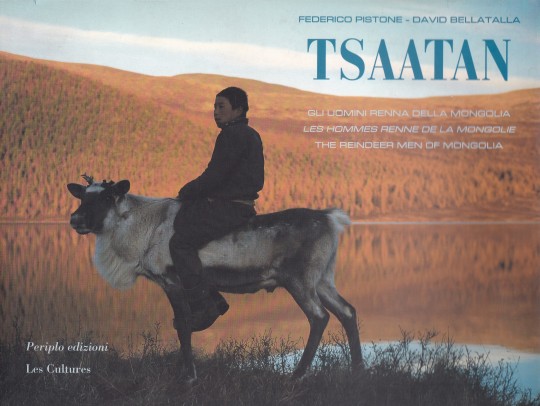
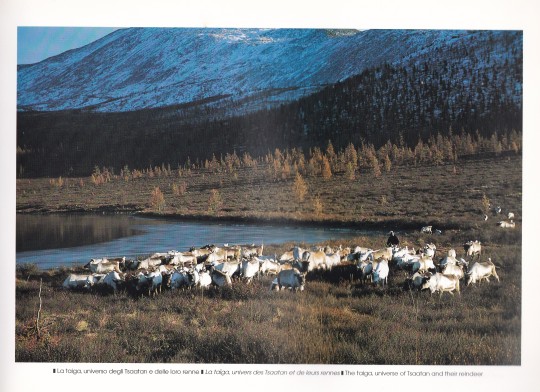
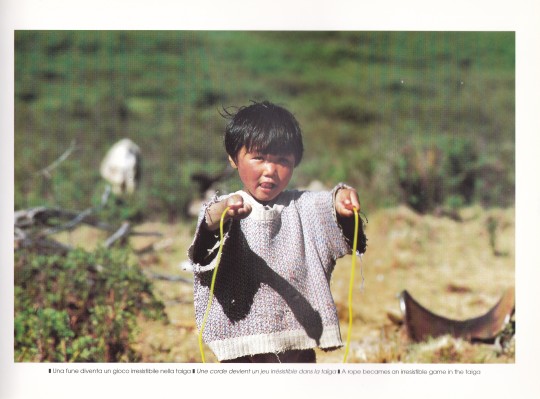
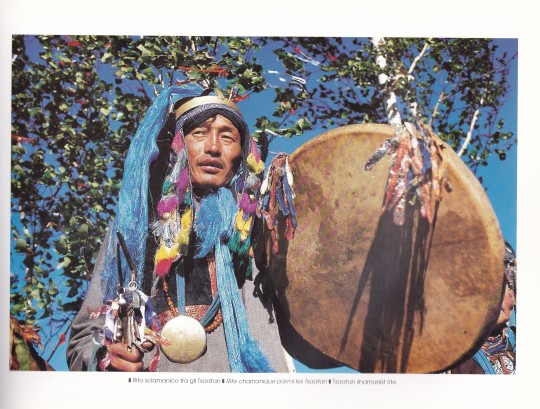
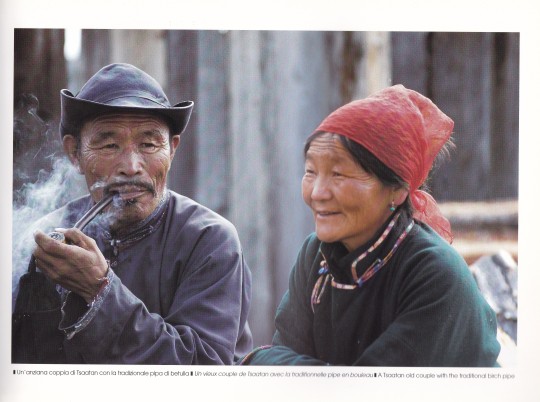
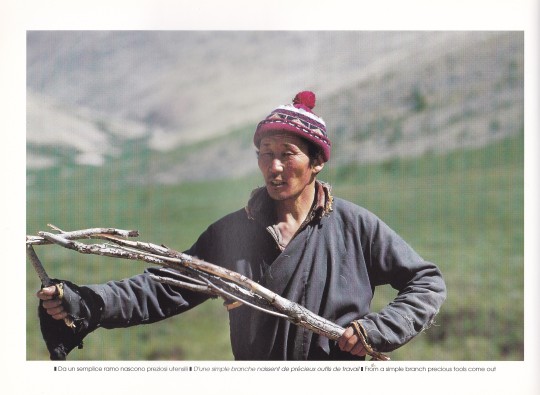
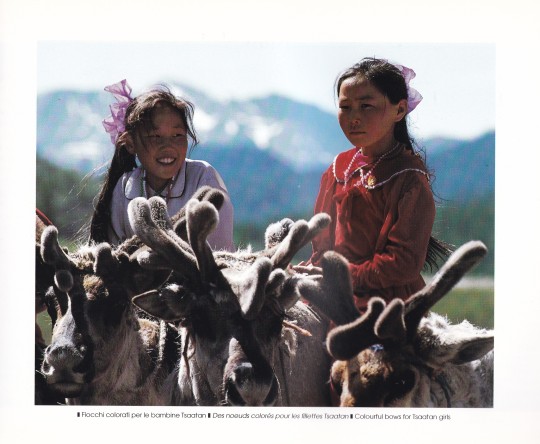
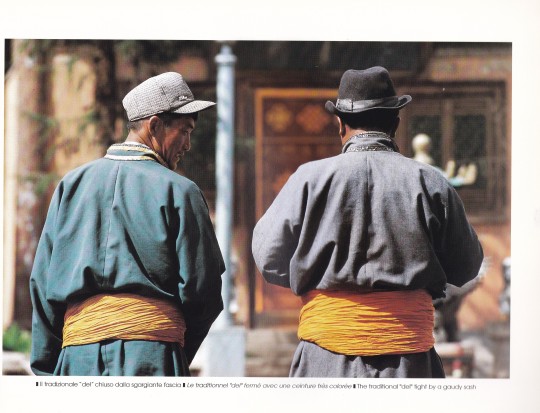
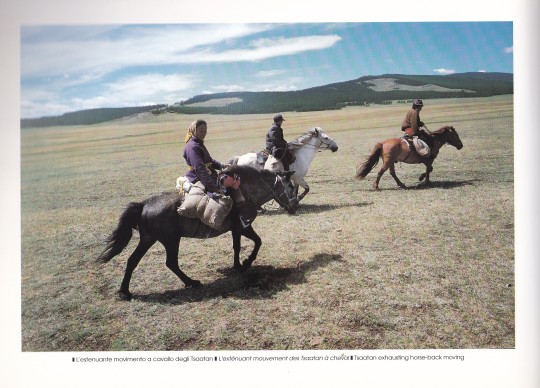
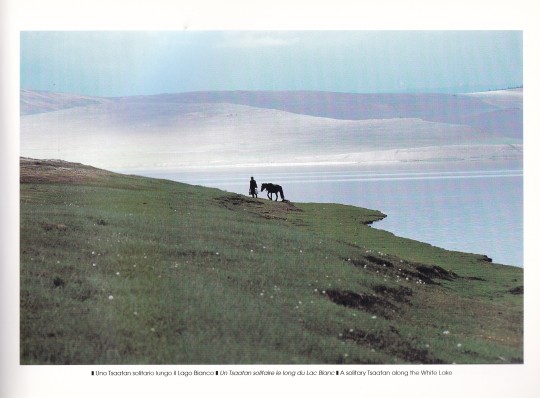
Tsaatan
Gli uomini renna della Mongolia, Les hommes renne de la Mongolie, The Reindeer Men of Mongolia
Federico Pistone, Fotografie Federico Pistone, David Bellatalla
Periplo edizioni Les Cultures, Lecco 2000, 109 pagine, paperback, sopracopertina illustrata a colori, testo in italiano, inglese e francese, ISBN 9788886113052
euro 25,00
email if you want to buy [email protected]
Gli Tsaatan, letteralmente uomini renna, sono nomadi sull’orlo dell’estinzione, fatalmente legati a tradizioni ancestrali. Sono ormai meno di duecento e sopravvivono in condizioni proibitive nel nord della Mongolia, al confine con la Siberia. Gli Tsaatan, che non sono mai entrati a contatto con la civiltà, sanno leggere e scrivere, e pongono l’istruzione al primo posto nella gerarchia dei valori sociali. Le renne sono il principale sostentamento (latte, carne, pelli) e anche per i bambini rappresenta l’unica occasione di svago: le cavalcano con consumata maestria lungo le vallate che si aprono intorno all’accampamento di urtz, le classiche tende. Gli Tsaatan mediano tradizioni mongole e turco-altaiche. Si affidano allo sciamano, venerano e temono gli spiriti del cielo e della terra e adottano antichi riti funebri. Questo volume narra del viaggio attraverso una terra aspra e sconfinata, la taiga, al fianco di uomini che custodiscono con commovente tenacia il valore della loro libertà.
orders to: [email protected]
twitter: @fashionbooksmi
flickr: fashionbooksmilano
instagram: fashionbooksmilano
tumblr: fashionbooksmilano
05/02/23
#Tsaatan#uomini renna#nomadi mongoli#Mongolia#Federico Pistone#photography books#cavalieri renne#popolo taiga#fashionbooksmilano
42 notes
·
View notes
Text
Tsaatan or Dukha people of Mongolia

Extreme north of Mongolia, resides a tribe called the Tsaatan, or the Dukha people. Tsaatan means people of the Reindeer. True to the name, their life revolves around their Reindeers.

They say that if the Reindeer dies, so will their culture along with them.


These nomads move around based on the season and are in tight-nit communities. The Reindeers serve the purpose of The families I met during my cultural expedition of the forgotten tribes of Mongolia, were quite skeptical about how much longer their culture will remain, as the younger generations are all moving out to the cities for a better 'settled' life.





The kids, I envied them, for they had the whole Taiga as their home, their playground, their school and also their work.



They would wade in the flowing stream by their tents, walk the Reindeers to the mountains, run behind the two dogs that they had, feed the young ones of the Reindeer, and then settle down by sunset in their cozy warm tents.

Definitely a tough life, to keep moving from place to place, and now with the younger lot moving to the cities, looks like another culture on the brink of dying out. Now that more and more people want to go meet them, I hope that their culture stays and the tourism takes care of their daily needs and resources. A catch-22 situation though.

Following are some flora and butterflies and critters that I came across in that region. By the way, you should see the last one.. the size of the mosquitoes there I tell you!!









#tsaatan#dukha#dukha people#nomads#nomadic tribe#reindeers#reindeer people#taiga#mongolia#north#nature#central asia#lost tribes#photography expedition#ismail#ismail shariff#snow leopard man
31 notes
·
View notes
Photo
The Tsaatan (Dukha) Reindeer Nomads from the Mongolian North, or the Dark Heavens. Photographs by Hamid Sardar-Afkhami.
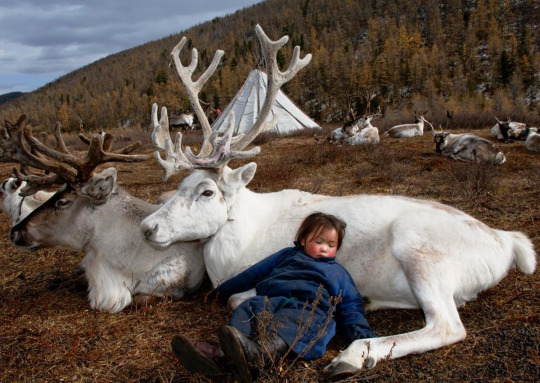
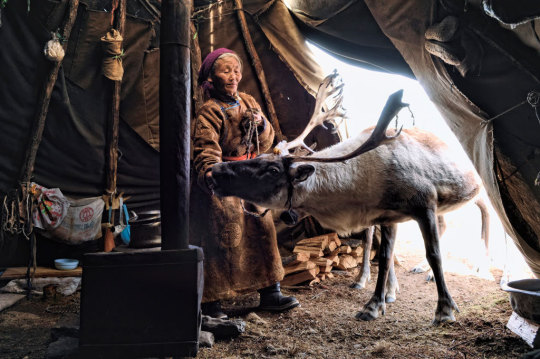
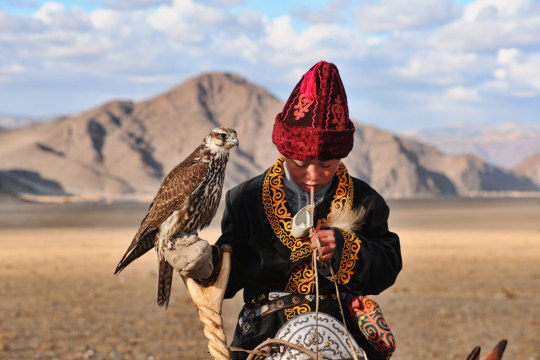
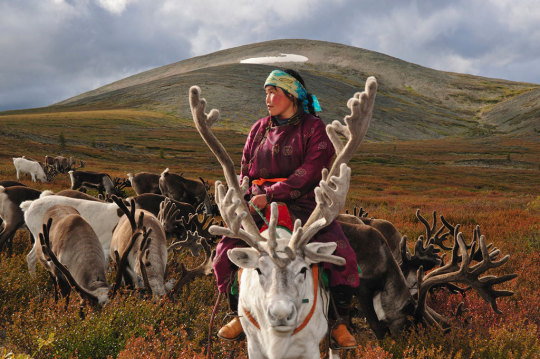
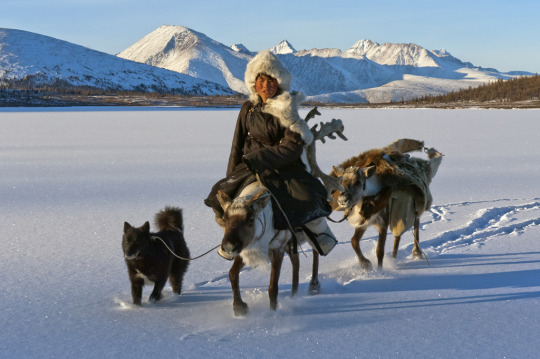
#child#children#man#men#woman#women#humans#nomad#nomads#reindeer#animal#animals#water#ice#snow#reindeer nomad#reindeer nomads#mountain#mountains#tsaatan#dukha#mongolia#mongolian#indigenous#hamid sardar-afkhami#photography#nature
50K notes
·
View notes